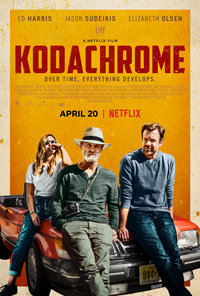Picture This: Raso’s Estranged Road Movie Wrecks At The Starting Gun
 Coming across like a thin coat of bright paint over dated decorative wallpaper sans originality, Mark Raso has outwardly attempted a love letter to analog photography, utilizing a remarkable cast and a wide array of scenic locations to do so. However (in actuality), Kodachrome is a succession of gimmicky plot lines so exhaustingly predictable that only a paltry few micro-moment snapshots of enjoyment actually bleed through.
Coming across like a thin coat of bright paint over dated decorative wallpaper sans originality, Mark Raso has outwardly attempted a love letter to analog photography, utilizing a remarkable cast and a wide array of scenic locations to do so. However (in actuality), Kodachrome is a succession of gimmicky plot lines so exhaustingly predictable that only a paltry few micro-moment snapshots of enjoyment actually bleed through.
Inspired by the 2010 New York Times article by A.G. Sulzberger, “For Kodachrome Fans, Road Ends at Photo Lab in Kansas”, the film centers on Matt Ryder (Jason Sudeikis), a struggling A&R executive who has just lost his biggest band to another music label. While writing metaphoric checks he cannot cash to save his job, he is given news that his father Ben (Ed Harris), a world-renowned photographer, is dying of cancer. As he has been estranged from his father for over a decade, Matt is at first dismissive of this revelation. He is eventually convinced by Ben’s manager (Dennis Haysbert) to take a road trip to Kansas with Ben and his nurse Zoe Barnes (Elizabeth Olsen), in order to develop some of Ben’s earliest photographs at the last Kodachrome lab before it closes its doors for good.
Harris’ performance is the pinnacle of the film; wringing as much awkwardness, anger, and sorrow that he can out of each moment he’s on screen (and supposedly channeling Joseph Beuys with a similar white fedora and surly demeanor). Harris, Sudeikis and Olsen all have interchangeable and jivable chemistry, and their quick banter can be sardonically joyful. However, that’s more or less where the high points end.
Though playfully whimsical in its premise, Jonathan Tropper’s screenplay is a frustratingly typical A-to-B slog overtread with cliches that have played in every safe road comedy over the past couple of decades (only this one has photography and music industry gimmicks). Though going with a safe formula is not always detrimental, Kodachrome is so utterly predictable that, within the first ten minutes, exactly how it is going to end is plainly determined; and the rest of the film can be spent quoting actors’ lines before they say them (which can easily happen almost scene-to-scene).
There could have been something significant in the metaphorical (and literal) “analog versus digital” discussion that the film inevitably bumbles at having, if it weren’t so focused on its lead characters out-competing each other and seemingly stealing dramatic touches from Magnolia. Also, for a film so focused on appealing to specific niches with its photography, music, and existential motifs, it doesn’t experiment or explore much through its cinematography, soundtrack, and themes.
Alan Poon’s camerawork is economical to a fault, hardly utilizing the environments that film drives amongst to paint interesting compositions, which also reflects the cast’s lackadaisical blocking. Though the music can be a nostalgic ride for many, it does little to elevate the experience, and a bar scene where Sudeikis and Olsen sing along with the band Live is just outright painful.
There is indeed an overarching sense of earnestness here, and Raso struggles to keep it alive, but it amounts to beating the fossil of a dead horse. The movie seemed to want to comment on the many ways lives can be lived, what chances should be taken, and what regrets can make us better, but its plethora of contrivances and conveniences cheapen any message it was possibly going to share. Ultimately, Kodachrome is a tired, insipid journey.
★½/☆☆☆☆☆


